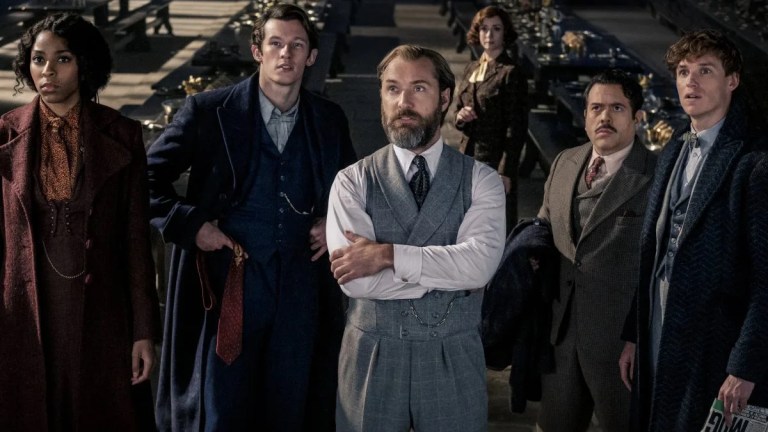Fantastic Beasts: The Secrets of Dumbledore – It Can End Here
Fantastic Beasts: The Secrets of Dumbledore once again overstuffs the Wizarding World with too much information. But it's a step up and provides a pretty solid place to end Newt Scamander's story.

Following the Wizarding World Universe canon seems to be a complicated thing, especially when the author of said universe is constantly changing it. The last film Fantastic Beasts: The Crimes of Grindelwald seemed to throw out everything audiences knew about the history of the Harry Potter universe and created a mess as a result. Though there are still a lot of canonical problems, The Secrets of Dumbledore does try to right some wrongs by finally answering questions lingering for fans—including about Credence’s (Eza Miller) family history, Queenie’s (Alison Sudol) sudden heel turn, and who is Jessica Williams’ character we randomly saw instructing the immortal wizard Nicolas Flamel in the last movie?
Set prior to the events of World War II, Fantastic Beasts: The Secrets of Dumbledore finds Albus Dumbledore (Jude Law) and Grindelwald (now Mads Mikkelsen) attempting to mediate Grindelwald’s plans to overthrow the Muggle world. Due to their unbreakable vow to not harm each other—and essentially their love for one another—Dumbledore and Grindelwald must find others to do the job for them.
Grindelwald, who has a bunch of plans lined up, is hopeful that Credence will use his anger from being abandoned by the Dumbledore family to end Albus’ life. Meanwhile our resident magizoologist, Newt Scamander (Eddie Redmayne), is looking for a beast called the chilan to protect in his sanctuary. But he too is thwarted by Credence, who takes the calf of the chilan to use in Grindelwald’s wicked plans. This causes Albus to call upon Newt, Ilvermorny Professor “Lally” Hicks (Jessica Williams), Yusuf Kama (William Nadylam), Newt’s brother and head of the British Ministry of Magic, Theseus Scamander (Callum Turner), and muggle Jacob Kowalski (Dan Fogler) to find a way to stop Grindelwald from ruining the upcoming elections of the Head of International Confederation of Wizards.
While the new film is a vast improvement on the last, the story once again starts off chaotic and is overstuffed with information that may or may not be integral to the plot. Instead of just moving forward with the narrative, the film redundantly recaps the last movie in an attempt to fill in that film’s gaps. Dumbledore’s screenplay, written by J.K. Rowling and Steve Kloves, is simply too much to absorb in the first two acts and will leave even the most knowledgeable Potter fans scratching their heads a bit. David Yates’ direction of the film is similarly all over the place, albeit finally settling down by the third act, which ends with a satisfying conclusion.
Like the previous films, the set design and world building are absolutely stunning. It’s unfortunate that it is obscured by the overuse of CGI when it comes to the chase and fight sequences. The beginning chase sequence between Newt and Credence in the forest, for example, felt dizzying and a bit confusing as to what is going on, or who is chasing who. It wasn’t until the end when Credence shows up with the calf for Grindelwald that you realize Credence was even involved in the scene.
Redmayne and Law continue to prove they were meant to portray these iconic characters in this world and set up new memorable characters like Albus’ brother Aberforth (Richard Coyle), the expansion of Bunty’s (Victoria Yeates) role, and Hicks, although her parodied 1930s accent did become distracting at some points. But many of the others were left feeling wasted, with Yusuf, Credence, Queenie, and Theseus’ storylines appearing like afterthoughts. Some of the character arcs don’t even make sense.
The whole purpose of the Fantastic Beasts franchise was to introduce the world to magizoologist Newt Scamander and the people in his life, but the last several films end up sidelining him into a supporting role for the real current stars: Dumbledore and Grindelwald. Although Mikkelsen did his best in the role given to him, and which was initially played by Johnny Depp, his version of the character now also feels out of place. The last movie focused on how sinister Grindelwald is as a menacing, almost-Aryan totalitarian wizard and the depths he’s willing to go for all-out war to wipe out any Muggle blood. The character went as far as even having a muggle child murdered.
But this version of Grindelwald, whose identity change is never addressed, seems a little suaver, and tamer when it comes to matters of torture. There is nothing wrong with that as it’s refreshing to not have to see cruelty on-screen, but it also felt out-of-character from the Grindelwald whom filmmakers previously wanted the audience to perceive as the ultimate evil. However, this new version of Grindelwald also shows the allure the character would have for Dumbledore, who proudly proclaims his love for his former friend, as opposed to the terrifying Depp version.
Speaking on that, the film finally addresses Dumbledore’s sexuality by having him profess his love for another man. But after all these years of wanting the films to confirm what was known for years, it was underwhelming in its presentation. Due to the ongoing controversy surrounding Rowling and the LGBTQ+ community, the big reveal sadly feels more like damage control than something sincere and romantic.
There is a lot of fan service like that throughout the film with the incorporation of Hogwarts and the students from different houses interacting with the main characters. It was heartwarming watching Gryffindors and Slytherin students showcase their typical, known behaviors around Jacob, including Slytherin students pranking the poor muggle with bug candy.
While the film doesn’t add anything new to the franchise other than pushing the narratives along, the underlying themes presented were a nice element to add, especially the importance of brotherhood. Newt and Theseus do share a sweet moment as they go through some complications in their plans against Grindelwald, which is all the more endearing when you see how it echoes Albus and Aberforth.
Unfortunately, The Secrets of Dumbledore does a disservice to the character of color. One would think after the treatment of Nagini (Claudia Kim)—having an Asian woman turn into an animal only to be enslaved and turned into a pet for an eventual overlord—the film would learn their lesson on inclusion and diversity. Yet the two new people of color, who are running for Head of the International Confederation of Wizards, Brazilian Minister Vicência Santos (Maria Fernanda Cândido) and Chinese Minister Liu Tao (Dave Wong), hardly say a word despite their importance in the overall plot. Cândido and Wong are merely used as set dressing for the white characters to save from the terror of Grindelwald.
Although The Secrets of Dumbledore does try to answer many of the holes in the last film, new questions arise as to whose story is being told. The film series is ambitious in trying to create this large world with many important characters like, say, Lord of the Rings, but Rowling’s world is obviously not that. Thus the film is mostly saved by the third act finally making sense and providing a rewarding ending that is reflective of the Potter films before.
Although there are two more films of the Fantastic Beasts franchise in the works, the writing team needs to figure out a better way to incorporate Newt and his friends into this overarching story of Dumberdore and Grindelwald’s eventual legendary duel. Otherwise, The Secrets of Dumbledore perfectly polishes a happy conclusion for the magizoologist and his colleagues, so if this story marked the end for Newt and his Fantastic Beasts, it would be enough.
Fantastic Beasts: The Secrets of Dumbledore opens everywhere on April 15.
